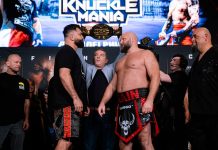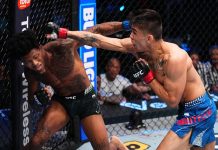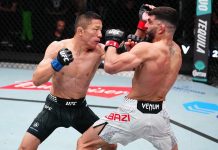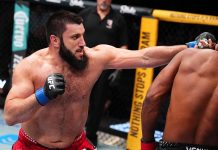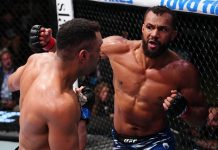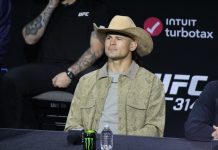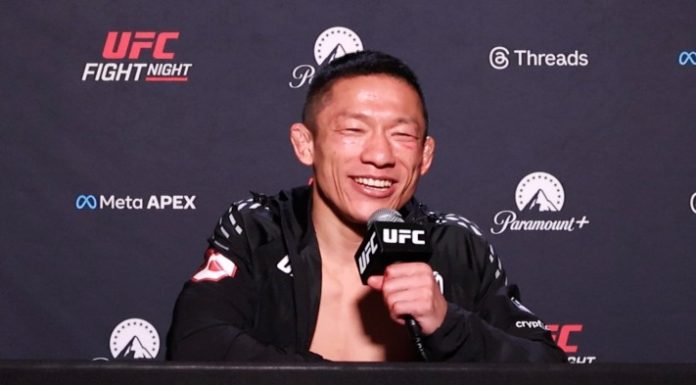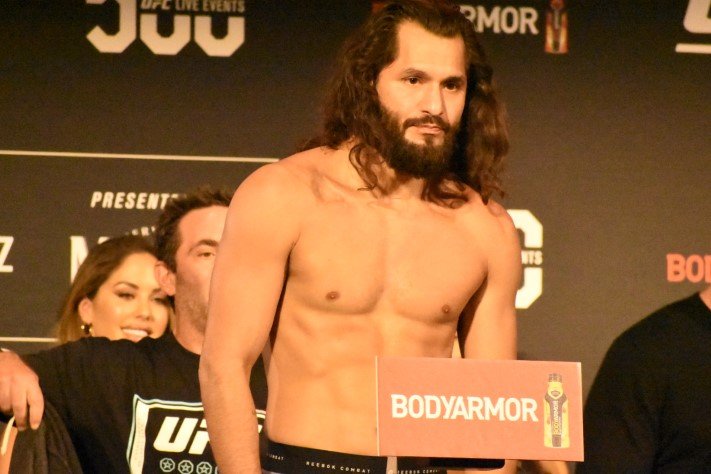
First Round Management really needs no introduction to MMA fans. The firm is led by the Kawa brothers, while Matt Weibel is another high-level agent working with FRM. Some of the best fighters in the sport are managed by First Round Management. Pettis, Arlovski, Penn, Masvidal, Woodley, Romero, to name a few. They also represent NFL players, including Chandler Jones.
How did you get into MMA?
MW- “I got into MMA in late 2010, when a friend of mine (Matt Robinson) showed me jiu-jitsu. I began to fall in love with the sport after watching a few different fight nights and pay per views, and began training in early 2011.”
What got you into wanting to be a manager and how did it happen?
MW- “In 2013, I was matchmaking shows and scouting out talent that I felt could potentially reach the bigger shows. I was connected to Abraham Kawa after working with their client, Matt Schnell on a fight, and began sending him many top prospects from my area, in hopes this would allow these fighters to gain bigger opportunities. After a couple months, Abe recruited me over and offered me a position at First Round Management. I was thrown right into the fire and began learning from the best in the game.”
How do you go about finding new fighters to sign? Are you actively watching the regional scene, maybe even watching ammy fights?
WB- “I’m always scouting out new talent. I love watching fighters grow as amateurs on the regional scene and constantly watching their progression. I don’t generally look for already established professionals, but will sign them if I feel like the relationship could be beneficial for both parties. I enjoy building prospects from the ground up, and I’m very picky about who I sign. If you look at my roster, many of them only have a handful of professional fights. A lot of these guys, I’ve been watching since their amateur debut. Watching them as amateurs gives me an inside look at how they dedicate themselves to the sport and their work ethics. These particular guys on my roster will be the stars of tomorrow, you will be hearing about them in the next few years.”
What are some mistakes made by other managers you notice?
MW- “One thing I see a lot of, is managers who over promise and under deliver. I don’t promise anything to my clients, other than the fact that I will work my ass off for them behind the scenes to get them the best opportunities possible. I’ve had several fighters from other agencies contact me saying their managers lead them on, promising them one or two more wins will get them in the big show, etc. There are no guarantees in this sport. I love giving my clients great news and great opportunities when they least expect it. If you over promise and under deliver, you lose all trust with your clients.”
What are some ups and downs of being a manager?
MW- “Managing fighters have the highest highs and the lowest lows. Obviously, the highs are watching guys you care about change their lives for the better, when they win big or earn huge opportunities. The highest of highs is calling a fighter and letting them know they’ve received a performance bonus, or telling them they’ve earned their UFC contract. I know these guys that I represent on a personal level, I know what that bonus money, or that contract is doing for them. It changes their lives. As far as the lows, obviously watching a client lose a huge opportunity for themselves is heartbreaking. I know how hard these guys work, some of them training full time, and to see them come up short is always a hard pill to swallow. But you have to get their spirits up and get them right back to work. This sport is unforgiving and opportunity will pass you by the longer you feel sorry for yourself.”
Let’s say you have a young fighter get an offer against an experienced fighter in a “dangerous fight? Are you more of a slow build like Michael Page or a fast push like Aaron Pico?
MW- “Definitely a slow build. I do my best to manage my client’s careers as a marathon, not a sprint. Young fighters have nothing but time, why rush into big fights so soon? Take your time, build your abilities. I have no interest in rushing a fighter. There’s no point in getting to the UFC, going 0-2 and getting cut. You’ll spend your entire career trying to work your way back. Michael Page is making great money fighting the way he is and taking hardly any damage while doing so. Meanwhile, Aaron Pico is taking loads of damage so early on in his career and likely won’t be fighting past age 30 because of it.”
What is your opinions on fighters managing themselves? How important do you think it is for a fighter to have a manager?
MW- “I think this is possibly the biggest mistake a young professional fighter can make, to go without management. I’ve seen fighters that have had outstanding amateur careers, just absolutely destroy their professional career with bad decision making/bad management. Grooming a prospect is hard work, and knowing what opportunities to take/turn down. Very often, fighters will take any opportunity given because they don’t know what’s out there, they don’t explore other options. Every fighter should have a great coaching staff and a great management company behind them. Fighters fight, coaches coach and managers manage. You need all parts to be working together smoothly.”
What is some advice you have for someone looking to get into the industry as a manager or someone just now starting?
– Ask questions.
– Take your time.
– Do your research.
– Be willing to learn from others.
– Under promise, over-deliver.
What is the toughest challenge as a manager?
MW- “Ensuring that all of your clients stay on the right paths that are discussed and helping them achieve their goals year in and year out. I wouldn’t necessarily call that a tough challenge… I think that’s just my way of testing myself, making sure my 20+ personal clients are maintaining that path to their goals.”
Who is a client/prospect you have on the team that is for the most part, unknown but you think has a high ceiling?
MW- “That’s a tough question, I have so many solid prospects on the roster. If I had to narrow it down to one, I’d pick the prospect that is the most well rounded in every aspect of the game, and that’s Ronnie Lawrence. For reference, two years ago, I was asked this question and my answer was Bryce Mitchell and Luis Peña. I feel the same way about Ronnie. He is relatively unknown at this moment, but by the end of 2020, he will be one of the nation’s top prospects, if not already in the UFC. Incredible striking, flashy, just what the UFC wants. Great wrestling (offensive and defensive), as well as phenomenal jiu-jitsu. His pace is unrelenting and at this moment, he would be a problem for anyone in the UFC’s bantamweight division. Look for 2020 to be Ronnie Lawrence’s breakout year.”
What is a goal you still haven’t reached but still something you want?
MW- “When I first started in management, I was 21 years old and my goal was to have a client reach the UFC by the time I turned 25. It’s hard to convince guys older than you, that you’re the best fit for their careers and to allow you to direct their paths. However, by the time I turned 25, I had 4 clients already fighting in the UFC. Now, my ultimate goal is to build a prospect from the ground up and watch them become a UFC Champion. I feel confident in my roster that I have multiple guys that will wear gold before it’s all said and done.”

